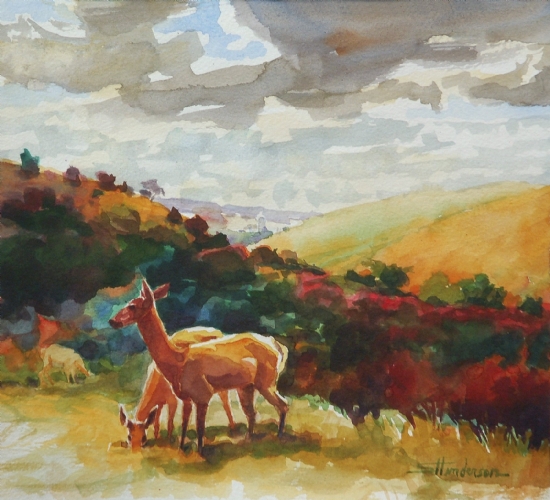“I know your deeds, that you are neither cold nor hot. I wish you were either one or the other!” Revelation 3:15
The Biblical book of Revelation, despite assurances from those who make movies about it, is a complicated book, and there is no certainty as to what the End Times will look like, when they will happen, or whether or not airplanes will suddenly lose their pilots.

We spend so much time obsessing about what the book tells us about the future — or more accurately, what self-imposed prophetic interpreters tell us that it tells us about the future — that we miss its lessons for present day. Chapters 2 and 3, which address seven different churches and the unique aspects of each, are well worth reading and contemplating.
Every time I do, I find a bit of myself in each of the churches — Yes! like the church in Thyatira, I am now doing more than I did at first. And yes, like the Church in Philadelphia, I have little strength, but have not denied His name (no boasting on that latter aspect; what strength I have, comes from Him).
There is a little bit of all of us — individuals and church community — in each of the seven churches, and the words of the angels to these churches give us perspective on the past and present, in addition to the future — both as individuals and as a people.
Last but not least on the list is that of Laodicea, which is neither cold nor hot, but suffering from the attitude of, “’I am rich; I have acquired wealth and do not need a thing.’ to which the angel’s response is,
“But you do not realize that you are wretched, pitiful, poor, blind and naked.” (3:17)
It’s Easy to Be Apathetic
Quite frankly, none of us enjoy enduring or actively seek out challenging, difficult, wrenching, or painful circumstances, and a happy state of being is generally thought to be one in which we have all we need, preferably with that acquired wealth. (If this were not a prevalent problem in our outlook, prosperity preachers would not be so literally, and wildly, successful.)
And while there is nothing wrong with having enough, plus a little more, when we are in this state is when we are in most danger of becoming Laodiceans, so focused upon the importance of things and issues which, ultimately, take up our time and attention, but do not engage our heart. Because we don’t see our need for God — when the twice monthly paycheck is being regularly deposited electronically and our needs are thereby being effortlessly met — we can fall away from seeking Him, thinking about Him, talking about Him, desiring Him, literally living for Him.

In other words, we are in danger of becoming apathetic.
“Complaint against God is far nearer to God than indifference about Him.”
This quote is from George MacDonald, a 19th century Scottish Christian thinker who is known for the many novels he wrote, and more importantly for our purposes, his deeply thought out theology, with a central message concerning the unconditional love of God our Father. (C.S. Lewis, in his book George MacDonald, says, “Few of his novels are good and none is very good.” But though he was a poor novelist, he was a supreme preacher, Lewis continues, with “some of his best things . . . thus hidden in his dullest books.”)
And this quote is one of those best things: an acknowledgement that we humans do not always sing the praises of our God, extolling His goodness in a song worthy to be led by a slick professional worship team upon the platform. Sometimes, we gripe — Jeremiah of the Biblical book by his name is frequently called the complaining or weeping prophet, for passages like 20:7-8:
“O Lord, you deceived me, and I was deceived; you overpowered me and prevailed. I am ridiculed all day long; everyone mocks me.
“Whenever I speak, I cry out proclaiming violence and destruction. So the world of the Lord has brought me insult and reproach all day long.”
And while it’s quite easy to point a finger at the man and judge from a distance, he was thrown into a cistern and left to die. Jeremiah’s life was not an easy one, and like any human being (the prophets were human, after all), he complained. God did not turn His back on Him and walk away — He never does — and yet, when we are hurt and anxious and angry and we mention this to others, we are frequently told that this is what will happen to us, because God is so disgusted by our anger.
Not so. Anger, frustration, hurt, despair, confusion, fear — these are strong feelings, they are cold, or hot, not lukewarm, and God is not disgusted by feelings. What He does not want to see in us, and what He will rebuke and discipline (Rev. 3:19), is indifference, apathy, a bored aloofness that neither loves nor hates God, but is unresponsive to His existence. On an operating table, this would be described as a dead body.
But our God is one who raises the dead, and that is what He can, and will, do for us when we lapse into somnambulant lethargy. We are beings created in His own image, a God of feeling and movement and emotion.
That is what He would have us be as well.
Thank You
Thank you for joining me at Commonsense Christianity where I strongly urge you to find MacDonald’s Unspoken Sermons (free on Kindle) and read them.
Posts complementing this one are
Does God Care If We Are “Excellent”?
Without God, We’ve Got 10 Minutes, Tops
Contemporary Corporate Christianity

